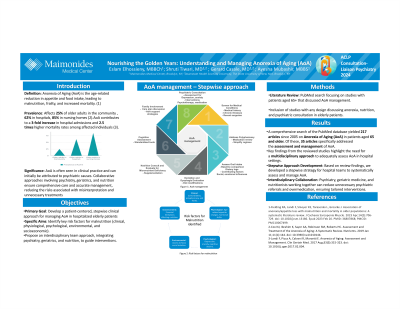Collaborative and Integrated Care
(063) Nourishing the Golden Years: Understanding and Managing Anorexia of Aging


Eslam Elhossieny, MBBCh
Psychiatry Resident
Maimonides Medical Center
Brooklyn, New York
Shruti Tiwari, MD
Assistant Professor
Maimonides Medical Center
Brooklyn, New York
Ayesha Mubashir, MD
Resident physician
Maimonides Medical Center
brooklyn, New York- GC
Gerard Casale, M.D.
Director of Geriatrics
Maimonides Medical Center
Verona, New Jersey
Presenting Author(s)
Co-Author(s)
Background:
Our relationship with food endures a variety of changes during our lifetime. The term Anorexia of Aging (AoA) indicates multifactorial reduction in appetite, regulation of food intake in the elderly even in healthy elderly populations, with adequate food sources available.
AoA is influenced by various factors including but not limited to the aging process. The reported prevalence of AoA ranges from up to 25% in home dwellers to 62% in hospital populations and 85% in nursing home populations (Cox et al. 2019). In hospital settings, the often- overlooked issue of AoA triggers unwarranted polypharmacy with appetite boosting medications and oftentimes results in psychiatric consultation. The absence of a systematic, stepwise approach within Consultation-Liaison Psychiatry potentially can lead to unguided interventions. The insufficiency of current strategies is evident(Megha Mulchandani et al 2021), necessitating a focused and interdisciplinary collaboration between C-L Psychiatry, Geriatric Medicine, and Nutritionists.
Methods:
The aim of this literature review was to get an understanding of AoA and based on that create a step wise, patient centered approach in management of AoA. Articles relating to studies with any study design were included if they discussed management of AoA in people with a mean age of 65+ years across PubMed.
Results:
Overall, findings suggest a need for developing a stepwise collaborative multidisciplinary approach in the elderly population for identifying risk factors for malnutrition that includes clinical, socioeconomic, physiological, psychological and environmental factors. We are in the process of developing screening tool/stepwise clinical approach to help guide the medical and psychiatric teams, staff members and nutritionists to develop a personalized care plan for elderly patients with Anorexia in hospital settings.
Discussion:
In hospital settings, older patients often present with decreased appetite and reduced caloric intake, prompting the involvement of psychiatry in their care for potential depression, either pre-existing or arising in the context of their medical condition. The complexity of this scenario arises from the tendency to overlook age-related physiological changes or attribute symptoms solely to psychiatric causes. Moreover, the risk of polypharmacy contributing to the presentation is substantial, as patients are frequently initiated on medications, including stimulants and antidepressants, without a comprehensive understanding of the underlying factors.
This situation highlights the need for stepwise approach to managing anorexia in older adults. The differentiation between physiological and pathological causes, including possible medical or psychiatric etiologies, is pivotal in guiding appropriate interventions and avoiding unnecessary pharmacological additions. A patient- centered approach not only enhances the effectiveness of the chosen interventions but also minimizes the risk of futile treatments.
Conclusion/Implications:
A patient-centered, stepwise approach to managing anorexia in hospitalized older adults can optimize care, decrease polypharmacy, and emphasize patients’ overall well-being.
References:
1- Landi F, Picca A, Calvani R, Marzetti E. Anorexia of Aging: Assessment and Management. Clin Geriatr Med. 2017 Aug;33(3):315-323. doi: 10.1016/j.cger.2017.02.004. Epub 2017 May 20. PMID: 28689565.
2- Cox NJ, Ibrahim K, Sayer AA, Robinson SM, Roberts HC. Assessment and Treatment of the Anorexia of Aging: A Systematic Review. Nutrients. 2019 Jan 11;11(1):144. doi: 10.3390/nu11010144. PMID: 30641897; PMCID: PMC6356473.
Presentation Eligibility: Not previously published or presented
Diversity, Equity, and Inclusion: The abstract underscores the importance of a multidisciplinary approach to managing anorexia in hospitalized older adults, which could significantly advance diversity, equity, and inclusion in healthcare. By recognizing the diverse backgrounds and needs of patients, especially in a diverse community like Brooklyn, tailored care plans can be developed to address cultural, socioeconomic, and psychological factors impacting individuals from historically marginalized groups. Additionally, Our presenting team includes four speakers with different backgrounds in training, geography, institution, race ethnicity and stage of career.

